As reported by The Conversation, home gardening became a popular activity during the initial stages of the COVID-19 pandemic. Since people were forced to stay indoors during that time, it was only natural that many of them would pick up gardening as a hobby. What’s more interesting is how this hobby ended up becoming a common thing even after the situation with COVID-19 cooled down.
At present, people set up small gardens around their houses wherever they find the space to do so. In a lot of cases, many of these people start gardening on their rooftops.
Rooftop gardening is arguably one of the most popular ways people are setting up gardens in their homes. However, to ensure a healthy and beautiful garden, one needs to put in the effort and time. If you are into gardening too and want to set up your rooftop garden, here are a few tips.
1. Ensure sunlight
The first step to ensuring your rooftop garden is healthy and beautiful is to make sure it gets enough sunlight. The amount of sunlight your plants will receive will depend on the time of year, the location of your rooftop, and the season in which you are planting.
Not all plants are created equal, and some require more sunlight than others do. If you want to grow a garden that will thrive, it’s important to make sure that the plants you choose will be able to tolerate the amount of light they’re getting.
It is important to note that if you live in a more northern area, like Chicago or Boston, your roof may not be able to get as much sun as it would in Atlanta or Los Angeles. If you live in a climate that doesn’t get much sunlight during certain parts of the year, you may have to consider planting some shade-loving plants instead.
2. Maintain a schedule for watering your plants
Maintaining a schedule for watering your rooftop garden is the most important thing you can do to ensure that it stays healthy and beautiful.
Watering your rooftop garden regularly, even if it doesn’t need it yet, will help your plants acclimate to the amount of moisture in the soil. This practice will also help to prevent overwatering and underwatering.
To know when to water, look at the plants themselves. If they appear wilted or droopy in any way, give them a drink of water. If you have any concerns about whether or not your plants are getting enough water, check with an expert at your local nursery or garden center.
According to The Washington Post, summers in the U.S. are getting hotter every year. The UK is dealing with something similar. Therefore, when things get hotter, you might want to take extra care when it comes to providing water to your rooftop plants.
3. Don’t go overboard with the weed killer
If you’re looking to maintain a healthy and beautiful rooftop garden, it’s important to remember that the weed killer you use can directly affect the health of the plants in your garden. Weed killers are designed to kill weeds, but they also kill any other plant life in their path. If your garden is growing near anything else, it’s important to either avoid using weed killer or use one that is safe for your other plants.
Besides, weed killers might lead to adverse health effects for you as well.
The Roundup weed killer has been found to cause different health problems. Many Roundup users developed cancer after their Roundup exposure. This led many individuals and organizations to join hands with law firms and sue the company.
Currently, the Roundup lawsuit settlement amounts per person is being estimated to be between $5,000 and $250,000. These settlement amounts are being demanded to pay the medical bills as well as cover lost wages and other expenses for the Roundup victims.
Thus, it’s always a wise idea to avoid using weed killers entirely or at least limit their usage.
4. Protect the plants against heavy rainfall and snow
One of the biggest challenges of rooftop gardening is protecting your plants from heavy rainfall and snow. If you have a large, flat roof, you may be able to build a simple structure that will prevent water from accumulating on it. You can also install gutters and downspouts to divert water away from your garden.
If your roof has slopes or protrusions, you will need to do more work to protect your plants. You can install a drainage system around the base of the garden bed so that any water that gets in drains away from the plants.
A study conducted by the University of Colorado Boulder reveals that community gardening can lead to amazing health benefits. It’s an activity that can improve your mental health and also help decrease the risk of cancer. Thus, there’s no reason why you shouldn’t involve yourself with gardening, and the open space on your rooftop might just be the best place to start.







